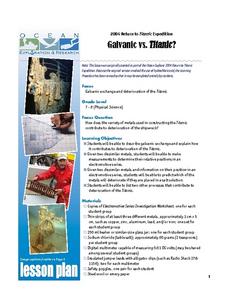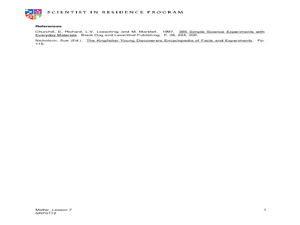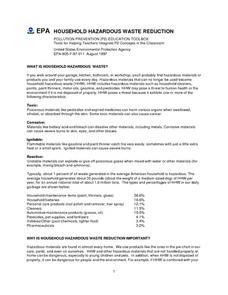Curated OER
The Transfer of Energy 3: Rust and Corrosion
Students research the type of chemical reaction that occurs when metal rusts. They conduct an experiment looking at the rate of corrosion in steel wool. This is lesson three in a three lesson unit on the transfer of energy.
Teach Engineering
How Can We Prevent the Corrosion Crisis?
Contemplate the causes of corrosion. An interesting lesson has learners first conduct an experiment where they place nails in different types of water. Based on the results, they consider how corrosion occurs and how engineers need to...
Curated OER
Fighting Corrosion to Save an Ancient Greek Bronze
Study corrosion on bronze statues with a hands-on lesson. As pupils place a penny in water with salt, they observe the changes in the penny throughout a period of a week. They then analyze the pre-conservation and the post-conservation...
Curated OER
Combating Corrosion
Students perform an experiment to show the chemical reactions that occur when metal corrodes. They apply the results of the experiment to the conservation efforts of art curators trying to restore an ancient Greek bronze. This lesson...
Curated OER
Combating Corrosion
Study corrosion on bronze statues with a hands-on lesson. As pupils place a penny in water with salt, they observe the changes in the penny throughout a period of a week. They then analyze the pre-conservation and the post-conservation...
Curated OER
Cents-ible Chemistry-Analysis of the Metal in a Penny
Students determine the base metals and surface metals in a penny. In this analysis of metals lesson plan, students determine the density of five pennies minted in different years. They use different chemicals such as hydrochloric acid,...
Curated OER
Corrosion & Rust
Young scholars examine how and when rust and corrosion occur. In this corrosion activity students complete an experiment to see why metals rust.
Curated OER
Corrosion/Conservation/Preservation
Young scholars examine the reasons why metal corrodes in regard to metal artifacts. In groups, they discover the affects of salt water on metal and compare the type of corrosion found on iron. They also research the types of metal...
Curated OER
Oxidation And Corrosion
Students investigate the concepts of oxidation and corrosion. They identify different metals and forms of corrosion.
Curated OER
Rusting-A Form of Oxidation
Students conduct an experiment to observe oxidation. In this chemistry lesson, students explain how rusting happens. They rank metals according to their conductivity.
Curated OER
Corrosion to Corals
Students study galvanic exchange and how it produces electric currents. In this ocean lesson students predict what metals deteriorate in salt water.
Curated OER
Galvanic vs. Titanic?
Students discover how galvanic exchange has contributed tot he deterioration of the Titanic. They perform an experiment in which they predict which of 2 metals deteriorate when placed in a salt solution.
Curated OER
Oxidation And Corrosion
Students sort tarnished metals by type and experiment with different cleaning solutions and techniques to restore them to their natural color and shine.
Curated OER
Rusting-A Form of Oxidation
High schoolers observe the rusting process in the lab. In this chemistry lesson, students rank metals according to their conductivity. They give real world applications of this activity.
Curated OER
Chemical Changes to Matter
Students analyze the causes of corrosion. In this chemistry lesson, students investigate what is necessary to cause chemical changes in matter. Students discover the causes of rust and tooth decay.
Curated OER
Periodic Table of the Elements
Students experiment with transition metals. In this transition metals lesson students find the common properties of transition metals and conduct an experiment using one of them. Students then answer questions regarding what they...
Curated OER
Periodic Behavior of Oxides
Students investigate the properties of oxides and observe their periodic trends. In this behavior of oxides lesson plan, students experiment with metallic oxides and non-metallic oxides to determine if they are acid, basic or amphoteric...
Curated OER
What a Can Can Do
Pupils explore properties of cans (including aluminum and steel) as they rotate through stations. They experiment with magnets, weight differences, resistance to corrosion and temperature conductivity.
Curated OER
What a Can Can Do
Young scholars explore the properties of a can. In this aluminum science lesson plan, students conduct various experiments to identify properties of aluminum. Young scholars examine the appearance, temperature, and corrosion resistance...
Curated OER
Rusting: A Form of Oxidation
Pupils observe and record the corrosive nature of oxidation-reduction reactions, and determine the electro-chemical series of selected metals.
Curated OER
Household Hazardous Waste Reduction
Students discover the different types of hazardous waste. They examine ways to dispose of the hazardous materials safely and without harming the environment.
Curated OER
Chemical Composition of American Coins
Students investigate the chemical composition of pennies dated 1983 or later. For this chemical composition of American coins lesson plan, students scratch the surface of the penny to expose the zinc core. They put the penny in...
Curated OER
pH Scale, acids and bases
Eighth graders define the pH scale, acids and bases. They distinguish between acidic and basic solutions using litmus paper. Students review simple chemical formulas. They define the subscript and coefficient in terms of chemical...
Curated OER
What Influences Reaction Rate?
Students study reaction rates, what determines how fast a reaction happens and how the chemical changes occur. In this reactions instructional activity students complete a lab where they use Alka-Seltzer to observe reaction rate and...

























